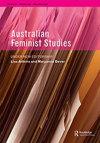Deterritorialising Death: Queerfeminist Biophilosophy and Ecologies of the Non/Living in Contemporary Art
IF 1.5
4区 社会学
Q2 WOMENS STUDIES
引用次数: 6
Abstract
ABSTRACT In the contemporary context of environmental crises and the degradation of resources, certain habitats become unliveable, leading to the death of individuals and species extinction. Whilst bioscience emphasises interdependency and relationality as crucial characteristics of life shared by all organisms, Western cultural imaginaries tend to draw a thick dividing line between humans and nonhumans, particularly evident in the context of death. On the one hand, death appears as a process common to all forms of life; on the other, as an event that distinguishes human from other organisms. Against this background, this article explores how contemporary art—in particular, the series of works The Absence of Alice (2008–2011) by Australian new-media and bioartist Svenja Kratz—challenges the normative and human-exceptionalist concept of death. By employing queerfeminist biophilosophy as a strategy that focuses on relations, processes and transformations instead of ‘essences’, the article examines the ways Kratz’s works deterritorialise the conventional concept of death. In this way, it hopes to attend to the intimacies between materialities of a human and nonhuman kind that form part of the processes of death and dying, and what follows, to reframe ethico-ontology of death as material and processual ecologies of the non/living.对死亡的威慑:当代艺术中的非生命主义生物哲学和生态学
摘要在当代环境危机和资源退化的背景下,某些栖息地变得无法生存,导致个体死亡和物种灭绝。虽然生物科学强调相互依存和关系是所有生物体共同的生命的关键特征,但西方文化的想象往往在人类和非人类之间划出一条厚厚的分界线,尤其是在死亡的背景下。一方面,死亡是所有生命形式共同的过程;另一方面,作为将人类与其他生物区分开来的事件。在此背景下,本文探讨了当代艺术——尤其是澳大利亚新媒体和生物艺术家Svenja Kratz的系列作品《爱丽丝的缺席》(2008-2011)——如何挑战规范和人类例外主义的死亡概念。通过采用酷炫主义的生物哲学作为一种关注关系、过程和转变而非“本质”的策略,本文考察了克拉茨的作品如何彻底否定传统的死亡概念。通过这种方式,它希望关注构成死亡和死亡过程一部分的人类和非人类物质之间的亲密关系,以及随之而来的,将死亡的伦理学本体论重新定义为非生命的物质和过程生态学。
本文章由计算机程序翻译,如有差异,请以英文原文为准。
求助全文
约1分钟内获得全文
求助全文
来源期刊

Australian Feminist Studies
WOMENS STUDIES-
CiteScore
2.50
自引率
0.00%
发文量
7
期刊介绍:
Australian Feminist Studies was launched in the summer of 1985 by the Research Centre for Women"s Studies at the University of Adelaide. During the subsequent two decades it has become a leading journal of feminist studies. As an international, peer-reviewed journal, Australian Feminist Studies is proud to sustain a clear political commitment to feminist teaching, research and scholarship. The journal publishes articles of the highest calibre from all around the world, that contribute to current developments and issues across a spectrum of feminisms.
 求助内容:
求助内容: 应助结果提醒方式:
应助结果提醒方式:


